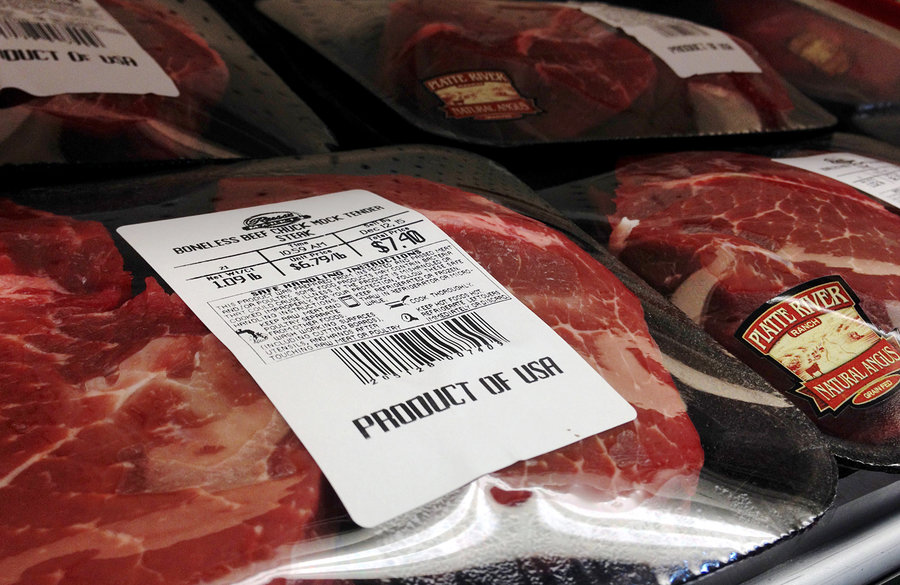Product of the U.S.A: Why Does the USDA Allow False Advertising for Meat?
 When I buy steak or burger, I always look for the Product of the U.S.A label. So, I’m buying U.S. beef right? Well, in truth, the Product of the U.S.A. label doesn’t mean much.Meat from foreign countries, like Mexico, Argentina and Canada, inspected by the U.S. Department of Agriculture (USDA) can carry this label. Which means, all meat sold in the U.S. could technically receive this label, because all meat sold in the U.S. must be inspected by the USDA.Or, it could mean that the cattle were born and raised in another country, but shipped to the U.S. to be processed.This false advertising needs to end.You may be asking yourself, “Why should I care?” The reason is simple – food safety.Those raising livestock in the U.S., must follow strict safety standards that protect consumers from ingesting an unsafe product; like meat from an animal infected with a disease or recently treated with antibiotics.U.S. regulations even extend to how U.S. livestock are treated. By law, U.S. farmers, ranchers and those who transport livestock must treat animals humanely.And, these regulations protect the environment too.U.S. livestock producers are happy to comply with these regulations.Other countries who get to label their meat Product of the U.S.A. are equally happy not to invest the extra time and money required to comply with U.S. regulations.Made in the U.S.A.Consumers have a right to know where their meat comes from.South Dakota Farmers Union has been a longtime advocate and joins with national organizations in supporting the correct labeling of meat because we believe in food safety and security.A secure food supply depends upon sustaining our family farmers and ranchers. They simply cannot compete in a marketplace that won’t recognize the extra time and money they invest to produce a superior, safe product.Share why you want honest labelingDo you like knowing where your food comes from? Then, I urge you to submit a comment to the USDA urging them to refine their labeling practices. The comment period was extended to September 17.To comment, click here.
When I buy steak or burger, I always look for the Product of the U.S.A label. So, I’m buying U.S. beef right? Well, in truth, the Product of the U.S.A. label doesn’t mean much.Meat from foreign countries, like Mexico, Argentina and Canada, inspected by the U.S. Department of Agriculture (USDA) can carry this label. Which means, all meat sold in the U.S. could technically receive this label, because all meat sold in the U.S. must be inspected by the USDA.Or, it could mean that the cattle were born and raised in another country, but shipped to the U.S. to be processed.This false advertising needs to end.You may be asking yourself, “Why should I care?” The reason is simple – food safety.Those raising livestock in the U.S., must follow strict safety standards that protect consumers from ingesting an unsafe product; like meat from an animal infected with a disease or recently treated with antibiotics.U.S. regulations even extend to how U.S. livestock are treated. By law, U.S. farmers, ranchers and those who transport livestock must treat animals humanely.And, these regulations protect the environment too.U.S. livestock producers are happy to comply with these regulations.Other countries who get to label their meat Product of the U.S.A. are equally happy not to invest the extra time and money required to comply with U.S. regulations.Made in the U.S.A.Consumers have a right to know where their meat comes from.South Dakota Farmers Union has been a longtime advocate and joins with national organizations in supporting the correct labeling of meat because we believe in food safety and security.A secure food supply depends upon sustaining our family farmers and ranchers. They simply cannot compete in a marketplace that won’t recognize the extra time and money they invest to produce a superior, safe product.Share why you want honest labelingDo you like knowing where your food comes from? Then, I urge you to submit a comment to the USDA urging them to refine their labeling practices. The comment period was extended to September 17.To comment, click here.

